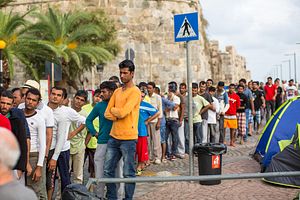A few weeks ago, Pakistan refused to accept more than 30 deported migrants from Greece and eventually sent them back on the same plane. This week, Turkey deported four Pakistani migrants. At least 90,000 Pakistani refugees, who had travelled illegally, were sent back last year.
Many deportations have been linked with terrorism. A month ago, Italy forcefully sent back a Pakistani citizen by alleging that he was involved in the Peshawar school attack, which killed more than 140 school children last year. In the latest flare up of tensions between the Islamabad and the European Union, Pakistan’s interior minister temporarily suspended an expatriation agreement with the EU.
Europe has been struggling to deal with one of the largest migrant crisis since the Second World War. Conflict and war in the Middle East has had a direct impact on Europe. In Syria, the situation has become so critical that hundreds of thousands of families have been forced to leave the country. With no final resolution to the crisis in sight, Syria in the near future may become a state with no remaining non-combatant population. According to the United Nations Refugee Agency, almost one million people, fleeing these conflict zones–mainly from the Middle East–have reached European shores in 2015.
Underneath this complicated situation, a dangerous trend has been on rise. The number of Pakistanis who have in the last few month sought to travel to Europe through illicit channels has risen. According to some released data by the EU, between 2010 and 2014, more than 14,000 Pakistanis crossed into Europe illegally every year. A month ago, hundreds of Pakistani refugees travelling with other migrants from Syria, Iraq, and Afghanistan clashed with the Macedonian police at the Greco-Macedonian border. Reportedly, they later blocked the passage for Syrians and others refugees while chanting “If we don’t cross, no one does!”
For the last decade, Pakistan has remained one of the largest refugee producing countries. Ironically, the situation in most of Pakistan does not amount to anything close to a conflict zone demanding forced migration or asylum. While Pakistan has faced militancy and unrest, circumstances haven’t descended to the extent where the Pakistani population was forced to migrate to avoid mass executions or killings. In fact, Pakistan is a country which has graciously hosted more than 1.6 million Afghan refugees–the largest number of refuges in a single state for a long time (until recently overtaken by Jordan).
Internal resettlements have happened in Pakistan’s tribal areas such as in Swat, as well as South and North Waziristan. They occurred because of military operations, which were launched to clear those areas from insurgents–particularly from the Pakistani Taliban.
While a small number of people have sought asylum due to religious persecution, a large proportion of migration has been for economic reasons. However, large numbers of these people come from areas that are economically stable. Punjab, which is supposed to be the richest province in Pakistan, has produced more migrants than any other province. A few districts in particular have been identified in this regard: the act of illegal human smuggling to Europe through different regional channels, mainly crossing the Middle East, has been commonly practiced in the Gujrat, Mandi Bahauddin, and Gujranwala districts of Punjab. Rather than reminding refugee-burdened Europen of its obligations under the mutually agreed repatriation treaty, Pakistan needs to formulate a comprehensive policy in order to deal with its human smuggling and illegal migrant networks.
It is important to further note that human trafficking networks do not operate in isolation. Rather, they heavily rely on transnational connections that cannot be stopped unless there is transnational cooperation. Pakistan should engage other neighboring state to devise a regional policy to break these networks. It’s encouraging to see that Pakistan has recently launched a campaign against domestic human smugglers. Over the past month alone, more than 250 human smugglers have been arrested by the Federal Intelligence Agency (FIA).
Moreover, in order to prevent these perilous journeys, which have resulted in hundreds of deaths, and further struggles once desired destinations are reached, an awareness program should be launched in areas which remain most vulnerable to trafficking networks. Furthermore, more economic opportunities should be put in place to discourage these trends which have sullied Pakistan’s name.

































